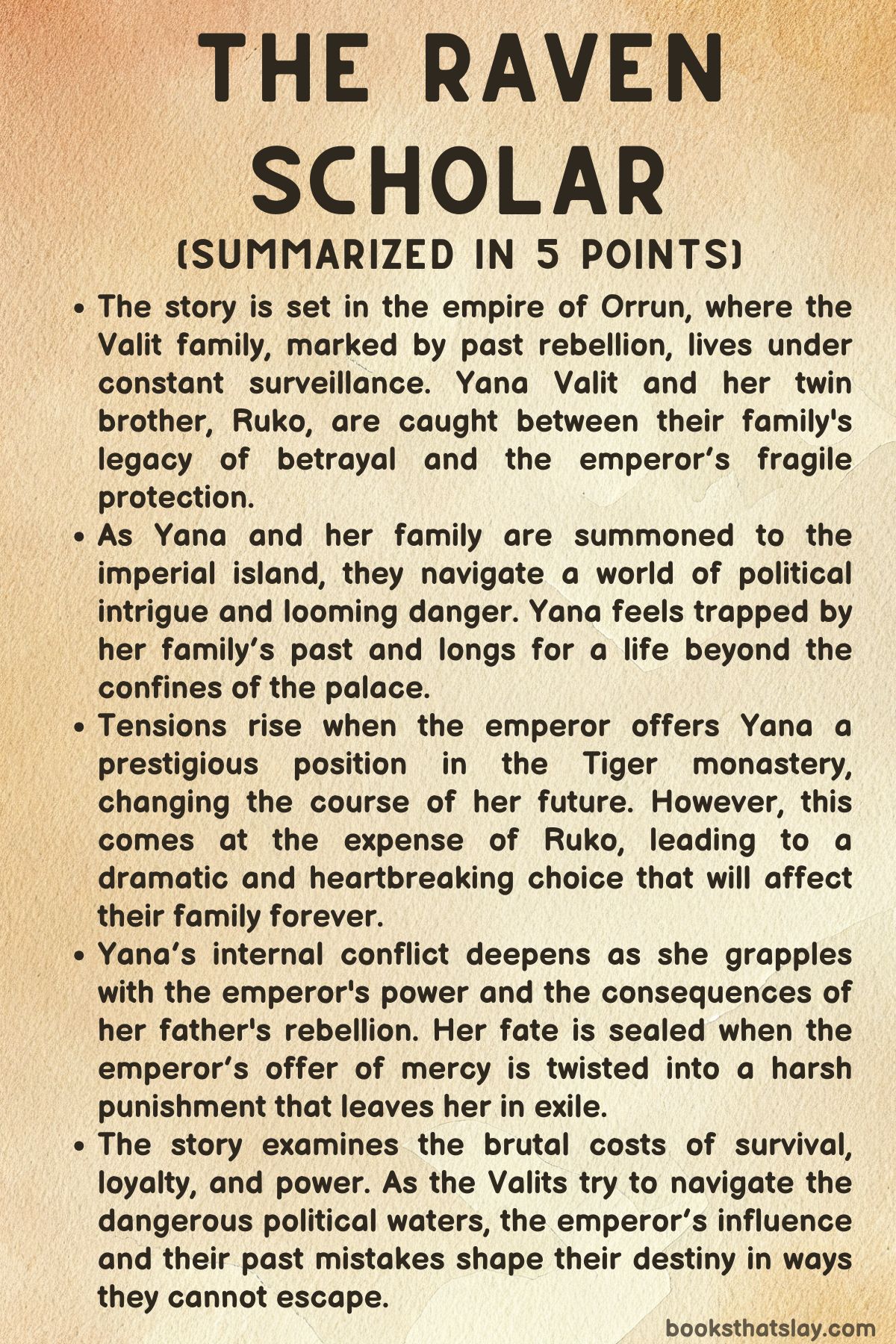The Raven Scholar Summary, Characters and Themes
The Raven Scholar by Antonia Hodgson is an intricate and compelling tale set in the empire of Orrun, where power, betrayal, and survival define the lives of its inhabitants. The story revolves around Yana Valit, the daughter of a notorious traitor, Andren Valit, and the complex legacy that haunts her family.
Amid a backdrop of political turmoil, Yana must navigate her existence under constant scrutiny, as her family is marked for betrayal. As the narrative unfolds, the stakes become higher with shifting allegiances, personal sacrifice, and the looming power of the emperor, all of which shape the destinies of the characters involved.
Summary
The story begins with Yana Valit and her twin brother, Ruko, walking through the opulent yet menacing halls of the imperial palace. Their family is steeped in tragedy, as their father, Andren Valit, was once a rebel who attempted to overthrow the emperor.
Now, years later, they live in the shadow of his betrayal. Their lives are under constant surveillance, and they are only protected by a fragile agreement with the emperor.
The imperial palace, rich in history and power, is a constant reminder of their family’s fall from grace.
Yana, feeling the weight of her family’s past, dreams of escaping the suffocating environment. But the Valits’ past is a stain on their reputation, and Yana is acutely aware of the price they have paid for survival.
The constant threat of discovery, coupled with their legacy of betrayal, leaves Yana and her brother perpetually on edge.
The Valits are summoned to the emperor’s island, a journey that both siblings view with trepidation. During their journey, Yana reflects on the life they lead, haunted by the betrayal of their father.
Although their lives are not directly threatened, they exist in a precarious position, constantly monitored and forever marked by their family’s history.
The tension escalates when the emperor’s enforcers, the Hounds, arrive at their home one night, bringing with them a summons. The Hounds’ arrival is a cold reminder of their position in the emperor’s eyes.
Their mother, Yasila, is calm and poised, as always, navigating the complex politics of court life. She manages the situation with grace, but Yana feels the pressure of her family’s fragile existence.
Yana and Ruko are haunted by the memory of their father’s death, which occurred in the very palace they now enter. Yana struggles to reconcile the actions of her father with the legacy that continues to affect her and her brother.
Their mother, Yasila, offers wisdom in a world filled with danger, but she is also a constant reminder of the cold political realities they face.
The emperor’s authority looms over them, and their lives are shaped by his mercy. Although spared from execution, Yana and her family live in constant fear of the emperor’s whims.
The emperor’s power is absolute, and his decisions have far-reaching consequences. As they approach the imperial island, Yana and Ruko are forced to confront the uncertainty of their future and the choices they must make to survive.
Upon reaching the imperial island, Yana is presented with an unexpected opportunity. The emperor offers her a position at the prestigious Tiger monastery, the highest honor one can achieve in the empire.
This opportunity presents both a chance for advancement and a challenge to her brother, Ruko, who had always assumed he would inherit his father’s place. The emperor presents Ruko with a choice: either let Yana take the position or step aside and allow her to claim it.
This decision becomes the catalyst for a rift between the twins. Ruko, feeling betrayed and overlooked, pushes Yana aside, choosing to exile her rather than allow her to take the position offered by the emperor.
This tragic decision sets the stage for a series of events that will change the course of their lives forever.
Yana’s exile is a bitter consequence of the emperor’s power and her family’s tragic past. The decision to spare her life while sending her away is a cruel twist, leaving Yana to grapple with the scars of her family’s rebellion and the consequences of her own survival.
As she faces the brutal reality of her exile, Yana must navigate a world that has never been kind to her or her family.
Through betrayal, familial loyalty, and the harshness of survival, the story explores the cost of power. The emperor’s control, the weight of history, and the decisions made by each character shape their fates in a world where nothing is ever truly secure.
As Yana struggles to find her place in a world that seems determined to tear her apart, she must face the harsh reality of a life defined by the actions of those who came before her.
The tension between family loyalty and survival is a central theme of the narrative, and it is clear that the choices made by each character will have far-reaching consequences. As Yana’s exile becomes a permanent reality, the consequences of her father’s rebellion continue to haunt her.
The emperor’s merciless grip on power and the ever-present specter of betrayal weigh heavily on the Valit family, shaping their lives in ways they can never escape.
In the end, The Raven Scholar is a story of survival, sacrifice, and the brutal cost of power. The characters are forced to confront the consequences of their actions, both past and present, as they navigate a world where every decision carries the potential for great loss.
The story is a reflection of the complexities of power, loyalty, and the human condition in a world defined by betrayal and political intrigue.

Characters
Yana Valit
Yana Valit is the daughter of Andren Valit, the infamous traitor who once led a rebellion against the empire of Orrun. Throughout the story, Yana struggles with the weight of her family’s history, living in the shadow of her father’s actions.
She constantly navigates a delicate balance, as the Valit family is under constant surveillance and their every move is scrutinized. Despite the emperor’s protection, Yana’s life is not free from fear, as she and her family are always at risk of being discovered and punished for their past.
Yana yearns for freedom and escape, imagining a life outside the palace and away from the oppressive history that haunts her. Yet, she understands that as the daughter of the “Great Traitor,” her fate is tied to her family’s legacy.
Her relationship with her twin brother, Ruko, becomes strained as they face their individual destinies. Yana’s internal conflict grows when the emperor offers her a position that could change her life, but at the cost of her brother’s ambitions.
This devastating choice forces Yana to confront the harsh reality of the emperor’s power and the deep scars left by her father’s rebellion.
Ruko Valit
Ruko Valit, Yana’s twin brother, shares the same burden of their father’s treason but carries a different set of expectations. He is determined to redeem the Valit name and follow in his father’s footsteps, believing that his destiny lies in claiming the throne.
Ruko is proud, ambitious, and consumed by the need to prove himself, which leads to a tragic confrontation with Yana. His relationship with his sister is complex, shaped by their shared history, but his personal ambitions create a rift between them.
When the emperor offers Yana a prestigious position, Ruko’s jealousy and frustration bubble to the surface, leading him to make the painful decision to push Yana into exile. This act of betrayal is the culmination of his internal struggle, as he chooses his own desires over his sister’s well-being.
Ruko’s arc reveals the dangers of pride and the personal cost of ambition in a world where power is everything. His choices not only affect his sister’s fate but also set him on a path of irreversible consequences.
Yasila Valit
Yasila Valit, the mother of Yana and Ruko, is a woman of political savvy and quiet strength. She is able to navigate the dangerous waters of court life, leveraging her intelligence and composure to protect her family.
While her husband’s rebellion and subsequent death left their family in a precarious position, Yasila has managed to maintain a delicate balance, securing her family’s survival by remaining under the emperor’s protection. Her wisdom is evident in how she handles the enforcers, the Hounds, when they visit the family.
Unlike her children, Yasila understands the stakes and the fine line between survival and rebellion. She is pragmatic and plays the political game with caution, making sure her family survives the turbulent world they inhabit.
Yasila’s character is a testament to the strength of maternal love and the sacrifices a mother makes to protect her children, even in the face of personal loss.
Neema
Neema, a scholar caught in the intricate web of court politics, struggles with her place in a world where power and ambition define one’s value. Her perfectionism and inner conflict make her a deeply nuanced character.
As she prepares for an important ceremony, Neema’s personal feelings of loneliness and alienation become clear. Her strained relationship with Gaida, a former peer, further complicates her emotional landscape.
Neema’s feelings of inadequacy are magnified by Gaida’s success and her passive-aggressive behavior during their interactions. Throughout the narrative, Neema reflects on the struggles she faced at the Raven monastery, where she fought for her place while others, like Gaida, had an easier path due to family connections.
Neema’s journey is one of self-discovery as she grapples with her role in a world filled with manipulation and betrayal. Her internal conflict intensifies as she uncovers dark secrets about the emperor and the Raven, leading her to question everything she thought she knew.
Neema’s character arc explores themes of ambition, power, and the emotional toll of striving for acceptance in a cutthroat society.
Brother Lanrik (Quen Quereka)
Brother Lanrik, formerly known as Quen Quereka, is a character defined by his transformation from a rebellious and disowned teenager to an influential religious figure. His journey is one of redemption and mystical revelation.
Lanrik’s story begins when he is cast out by his family at the age of 17, leading him down a dangerous path as a pirate. His eventual capture and imprisonment in the Ketuan prison mines marks a turning point in his life.
Through mystical dream encounters with the Fifth Guardian, Lanrik adopts a new identity and begins his spiritual journey. His rise to the position of abbot within the Anat-garra monastery is a testament to his faith and resilience.
Lanrik’s transformation from a dissolute youth to a revered religious leader reflects themes of atonement, redemption, and the power of faith. His character represents the possibility of change, even for those who have made grave mistakes in their past.
Andren Valit
Andren Valit, the patriarch of the Valit family, is a manipulative and ruthless figure who usurps the throne of Orrun from his son, Ruko. His actions set the stage for much of the conflict in the story, as his ambition and thirst for power lead to a series of devastating consequences.
Andren’s mastery of manipulation is evident in how he uses his charm and cunning to deceive those around him, including his own family. He is willing to use dark magic, such as the Soul Stealer curse, to seize control of the throne and further his ambitions.
The curse allows Andren to transfer Ruko’s essence into himself, physically altering his body in grotesque ways while mentally shattering Ruko. Andren’s character is marked by a ruthless desire for power and control, showing how far one can go in their pursuit of dominance.
His actions, fueled by a belief in his own superiority, lead to the destruction of his family and the destabilization of the empire.
Gaida
Gaida is a complex character, one who plays a significant role in Neema’s emotional and professional struggles. Gaida’s background, as a contender for the throne, places her in direct competition with Neema, and their interactions are charged with tension.
Gaida’s manipulative behavior, which includes passive-aggressive tactics, makes her a formidable presence in the narrative. Her success is often a source of discomfort for Neema, who has had to fight for every inch of her position.
Gaida’s rivalry with Neema highlights the themes of competition and the quest for power within the court. Her eventual death adds a layer of mystery to the plot, with Neema uncovering a conspiracy surrounding Gaida’s demise.
Gaida’s role in the story is pivotal, as her actions influence the decisions of the other characters, particularly Neema, and contribute to the complex political landscape.
Cain Ballari
Cain Ballari is one of the key political players in the narrative, vying for the throne in the midst of a turbulent power struggle. He has a complicated relationship with Neema, one that begins with a sense of camaraderie but grows more complicated as their paths diverge.
Cain’s motivations are driven by a desire for power and influence, but his relationship with Neema adds a personal dimension to his character. Cain’s involvement in the larger political machinations of the empire places him at the center of the conflict, and his actions, while often pragmatic, reveal his internal struggles.
His role in Neema’s escape and the unfolding conspiracy surrounding the emperor highlights the dangerous dynamics at play in the empire, where personal ambition and loyalty are constantly in flux.
Emperor Bersun
Emperor Bersun is a figure of central importance in the political drama that unfolds in the story. Initially presented as the ruler of Orrun, his true nature is revealed to be much more complicated as the narrative progresses.
Neema uncovers a conspiracy suggesting that Emperor Bersun may have been replaced by his brother Gedrun after a failed coup, which leaves Bersun gravely injured. The revelation that the emperor may not be who he appears to be shakes the very foundation of the empire’s power structure.
Bersun’s character is one that embodies the themes of power, deception, and betrayal, as his reign becomes the focal point of a larger struggle for control. His presence in the story is marked by political intrigue, as both allies and enemies vie for influence under his rule.
Themes
Power and Corruption
The theme of power and its corrupting influence is evident throughout The Raven Scholar. Power, both in the form of political authority and ancient mystical control, is shown to be a double-edged sword.
The emperor’s absolute authority over life and death is one of the clearest symbols of this corrupting force. Yana’s family, the Valits, have been marked by their father’s rebellion, and their very survival hinges on the emperor’s mercy.
This fragile existence highlights the complex relationship between power and survival in the empire of Orrun. While the emperor controls their fate, he does so with no compassion, reminding Yana and her family at every turn that they live only because it suits him, not because of any justice or grace.
Similarly, Andren’s usurpation of the throne and his use of dark magic to transfer Ruko’s essence into his own body illustrates the brutal extent to which one can go to seize and hold power. The Soul Stealer curse that makes Andren more powerful, yet grotesque, reveals how the pursuit of power leads to moral decay.
He is willing to sacrifice not only others but his own humanity in order to stay in control. This corruption is mirrored in the transformation of other characters, such as Brother Lanrik, whose rise to power in the religious community is as much about spiritual ascension as it is about leveraging influence.
These instances emphasize how the pursuit of power often strips away empathy, humanity, and even identity, leaving characters hollowed by their own ambitions.
The rulers, emperors, and their manipulations show that power can corrupt absolutely, leaving only a world of manipulation, betrayal, and eventual destruction. Andren, in particular, epitomizes the destructive effects of absolute control, creating a world where survival means bending to his will, and betrayal becomes the only means of advancement.
The consequences of this corruption reverberate throughout the narrative, affecting not only the rulers but also those who are subject to their power.
Family and Loyalty
Family and loyalty, especially in the context of betrayal, are central themes in The Raven Scholar. The Valit family, particularly Yana and Ruko, are trapped by the legacy of their father’s rebellion.
Their loyalty to each other, and to the memory of their father, is challenged by the emperor’s manipulations and the weight of their past. Yana’s internal conflict reveals her desire to break free from her family’s tarnished name and to escape the constant surveillance that defines her life.
However, she is bound by an inescapable sense of loyalty to her family and the shared history that continues to haunt them.
Ruko’s sense of betrayal is most pronounced when the emperor offers Yana the chance to rise to power in the Tiger monastery. Ruko, having believed for years that he would be the one to carry on his father’s legacy, feels rejected and betrayed by the emperor’s decision.
His subsequent actions—choosing to send Yana into exile—reveal the deep rift in their familial bond. The tension between sibling loyalty and individual ambition becomes a tragic moment in the story, highlighting how familial loyalty can sometimes be overshadowed by personal desires or grievances.
In contrast, Yasila, the mother of Yana and Ruko, embodies a different kind of loyalty—one rooted in political survival. Her wisdom and political acumen have allowed her to navigate the treacherous waters of court life, but her loyalty to her children and her husband is tested by the shifting political tides.
Yasila represents the harsh reality that, in a world defined by power struggles, loyalty can often be a luxury few can afford. The theme of loyalty in The Raven Scholar reveals how family bonds are often tested by larger forces, and how betrayal, both within and outside the family, becomes an inescapable part of survival.
Identity and Transformation
The theme of identity and transformation is explored through the characters’ struggles to reconcile their pasts with their present realities. Andren’s transformation from a powerful emperor to a grotesque figure, after using the Soul Stealer curse, represents the extreme consequences of altering one’s essence in pursuit of power.
His physical and psychological changes signal the loss of his humanity, showing how one’s identity can be consumed by the desire to control and manipulate. Andren’s transformation is not just physical—it is a loss of self, where his moral compass is replaced by a singular obsession with retaining power.
Similarly, Brother Lanrik’s transformation from a disowned pirate to an influential religious figure highlights the theme of personal change driven by external forces. Lanrik’s mystical experiences in the Ketuan prison and his subsequent rise to power suggest that identity is malleable and shaped by the circumstances one finds themselves in.
His adoption of the name Lanrik, which signifies a new beginning, further underscores the idea that one’s identity can be redefined in the face of adversity. However, his rise is not without its cost—his past as Quen Quereka is never fully erased, and the tension between his old and new identities influences his actions and decisions.
Yana’s internal struggle is also one of transformation. As she grapples with her father’s legacy and the looming threat of the emperor’s power, she begins to question who she is and what she wants to become.
The emperor’s offer of a new life in the Tiger monastery challenges her sense of self, and the decision she faces—to embrace this opportunity or to resist it—reflects her deeper search for identity. The narrative portrays identity as something fluid, shaped by both personal choices and external pressures, suggesting that transformation, whether through power, betrayal, or circumstance, is an inevitable part of the characters’ lives.
Betrayal and Deception
Betrayal and deception are pervasive themes in The Raven Scholar, woven into the personal relationships and the larger political landscape. The emperor’s manipulations, as well as Andren’s deceitful actions, demonstrate how betrayal is not merely an individual act but a systemic force in the empire.
Andren’s betrayal of his own son, Ruko, through the soul-stealing curse, is an extreme example of how those in power will sacrifice even their closest kin to retain control. The betrayal of familial trust is further echoed in the relationship between Yana and Ruko, as their bond is fractured by personal ambitions and the emperor’s scheming.
The theme of deception is also explored through Neema’s journey, particularly her investigation into the emperor’s true identity. Her discovery that Emperor Bersun might have been replaced by his brother Gedrun after a failed coup reveals the depth of the deception that permeates the empire.
Neema’s quest for truth, in the face of the Raven’s manipulations, shows how deception is a tool used not only by rulers but also by forces beyond human control. The deception surrounding Gaida’s death and the conspiracy that unfolds further complicates the narrative, illustrating how betrayal often stems from larger political and supernatural forces.
Through these layers of personal and political betrayal, the narrative paints a picture of a world where trust is fragile, and every character must navigate the treacherous waters of deception. The theme of betrayal is not confined to isolated acts but is part of a broader system of manipulation and control, where the line between ally and enemy is constantly shifting.
Fate and Free Will
The theme of fate versus free will is explored in the characters’ constant struggle to control their own destinies in the face of overwhelming forces. Yana’s life, shaped by her family’s past and the emperor’s mercy, reflects the tension between her desires for freedom and the inescapable grip of fate.
Her journey is marked by moments where she longs to escape the legacy of her father’s rebellion and carve out a new life, yet the emperor’s power over her family continually drags her back to the oppressive reality of her situation.
Similarly, Ruko’s internal conflict revolves around his belief that he is destined to follow in his father’s footsteps as the rightful ruler. His struggle to come to terms with his role in the larger political drama, especially after the emperor’s offer to Yana, forces him to confront the idea of destiny.
His tragic decision to send Yana into exile shows how, even when faced with the chance to control his own fate, he succumbs to the pressures of power and ambition.
In contrast, Neema’s journey is one of defiance against the forces shaping her life. Her desire to uncover the truth about the emperor and to escape the manipulations of the Raven highlights her battle to assert her own will against the pull of fate.
Throughout the narrative, the tension between fate and free will is a driving force, with characters striving to shape their own futures while being constrained by the power structures and supernatural forces that surround them.


